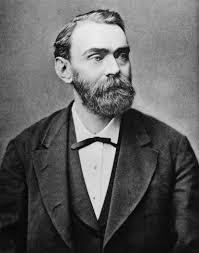Alfred Nobel is a name synonymous with innovation, philanthropy, and the prestigious Nobel Prize. Born in Stockholm, Sweden, on October 21, 1833, Nobel’s life journey was marked by a relentless pursuit of knowledge and a deep commitment to advancing human progress. In this blog, we’ll delve into the life, achievements, and enduring legacy of this remarkable figure in 900 words.
Early Life and Education
Alfred Nobel was born into a family of engineers. His father, Immanuel Nobel, was an inventor and engineer, and his mother, Andriette Ahlsell Nobel, came from a wealthy family. From an early age, Nobel showed a keen interest in science and engineering, nurtured by his father’s workshop, where he gained hands-on experience with explosives and mechanical devices.
Nobel received education both in Sweden and abroad, mastering several languages and acquiring knowledge in various fields. His voracious appetite for learning led him to study chemistry, physics, and literature extensively, laying the foundation for his future accomplishments.
Inventions and Innovations
Alfred Nobel’s most significant contributions to science came in the field of explosives. Inspired by his father’s work in arms manufacturing, Nobel dedicated himself to improving the safety and efficiency of explosives. In 1863, he patented dynamite, a revolutionary invention that transformed industries such as mining, construction, and warfare. Dynamite was safer and more stable than existing explosives, making it a game-changer in various applications.
Nobel continued to innovate, patenting several other inventions, including blasting gelatin and ballistite, a precursor to modern smokeless gunpowder. His inventions not only revolutionized industries but also had a profound impact on global development, enabling the construction of infrastructure such as railways, bridges, and tunnels.
The Nobel Prize
Despite his immense success as an inventor and entrepreneur, Alfred Nobel was deeply troubled by the destructive potential of his inventions, particularly in warfare. He witnessed firsthand the devastation caused by dynamite in conflicts around the world and became determined to leave a more positive legacy.
In 1888, Nobel’s life took a transformative turn when his brother Ludvig passed away. A French newspaper mistakenly published an obituary for Alfred instead of Ludvig, declaring him the “merchant of death” due to his invention of dynamite. Shocked and dismayed by this portrayal, Nobel decided to dedicate his fortune to a higher purpose.
In his will, written in 1895, Nobel bequeathed the majority of his wealth to establish the Nobel Prizes, awards honoring individuals who made significant contributions to humanity in the fields of physics, chemistry, medicine, literature, and peace. His vision was to reward those who promoted peace, scientific discovery, and cultural advancement, thus fostering progress and cooperation on a global scale.
Legacy of Philanthropy and Impact
The establishment of the Nobel Prizes cemented Alfred Nobel’s legacy as a visionary philanthropist committed to advancing human welfare. Since their inception in 1901, the Nobel Prizes have recognized countless individuals and organizations whose work has had a profound and lasting impact on society.
The Nobel Peace Prize, in particular, has become one of the most prestigious awards in the world, honoring efforts to promote peace, resolve conflicts, and address global challenges. From iconic figures like Martin Luther King Jr. and Mother Teresa to organizations like the United Nations and Doctors Without Borders, Nobel laureates have inspired hope and catalyzed positive change across the globe.
Beyond the Nobel Prizes, Alfred Nobel’s legacy extends to numerous charitable initiatives and foundations established in his name. These organizations support scientific research, education, and humanitarian efforts, empowering individuals and communities to address pressing issues such as poverty, disease, and environmental degradation.
Continued Relevance and Inspiration
More than a century after his passing, Alfred Nobel’s legacy continues to inspire generations of innovators, philanthropists, and peacebuilders. His story serves as a powerful reminder of the transformative potential of science, the importance of ethical responsibility, and the enduring value of generosity and compassion.
In a world grappling with complex challenges, from climate change to geopolitical conflicts, Nobel’s vision of progress through collaboration and understanding remains as relevant as ever. The Nobel Prizes stand as beacons of hope and recognition for those who strive to make the world a better place, reminding us all of our capacity to create positive change.
Conclusion
Alfred Nobel’s life was a testament to the power of innovation, philanthropy, and humanism. From his groundbreaking inventions to his visionary establishment of the Nobel Prizes, he left an indelible mark on the world, shaping the course of history and inspiring future generations to follow in his footsteps.
As we reflect on his legacy, let us honor Alfred Nobel’s memory by embracing the values of curiosity, compassion, and cooperation. By channeling our talents and resources towards the greater good, we can continue his mission of building a more peaceful, equitable, and sustainable world for all.






